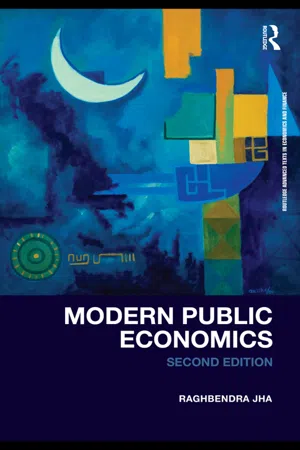
Modern Public Economics
Raghbendra Jha
- 624 pages
- English
- ePUB (mobile friendly)
- Available on iOS & Android
Modern Public Economics
Raghbendra Jha
About This Book
In recent times not only have traditional areas of public economics such as taxation, public expenditure, public sector pricing, benefit cost analysis, and fiscal federalism thrown up new challenges but entirely new areas of research and inquiry have emerged. This second edition builds upon the strengths of the previous edition and incorporates results of research on new areas such as global public goods, environmental taxation and carbon permits trading and the complexities of corporate taxation in a rapidly globalizing world.
The book is a modern and comprehensive exposition of public economics. It includes extended discussions on topics of particular interest to developing countries and covers subjects such as:
-
- taxation in an economy with a large informal sector
-
- the challenges of using VAT
-
- the use of randomized evaluation
-
- theory of public expenditure and public goods including global public goods
-
- incentive effects of taxation and tax incidence
This book discusses the major traditional areas of taxation and public expenditure as well as emerging issues relating to public economics in the globalized world economy. It will be useful as a reference and update on the modern literature on public economics for professional economists and policymakers, as well as providing invaluable information as a basic text for undergraduate and graduate students in public economics.
Frequently asked questions
Part I Welfare economics
Introduction to Part I
1 A quick primer on consumer demand
Key concepts: preference ordering; transitivity, quasi-transitivity and acyclicity of preferences; continuity and convexity of orderings; utility functions: direct and indirect, concave and quasi-concave utility functions; compensated and uncompensated demand functions; expenditure functions; Slutsky equation, consumer’s surplus, equivalent and compensating variations; Roy’s identity; excess burden of a tax; the Envelope theorem.